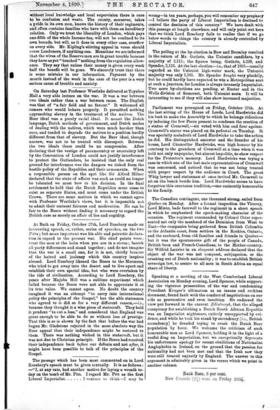At Bath on Friday, October 27th, Lord Rosebery made an
interesting speech, or, rather, series of speeches, on the two Pitts ; but more important was his able and patriotic declara- tion in regard to the present war. His chief points were : trust the man at the helm when you are in a storm; banish all party differences and stand together ; and do not imagine that the war is a small one, for it is not, chiefly because of the hatred and jealousy which this country inspires abroad. Lord Rosebery likened the Boers to the Mormons, who tried to get away into the desert and to live apart and establish their own special idea, but who were overtaken by the tide of civilisation. According to Lord Rosebery, the peace after Majuba Hill was a sublime experiment which failed because the Boers were not able to appreciate it at its true value. We cannot agree. No doubt the country imagined it was an attempt "to carry into international policy the principles of the Gospel," but the able statesmen who agreed to it did so for a very different reason,—i.e., because they thought it a wise piece of statecraft. They held it prudent "to cut a loss," and considered that England was great enough to be able to do so without loss of prestige. That this is so is shown by the fact that before the war had begun Mr. Gladstone rejected in the most absolute way the Boer appeal that their independence might be restored to them. There was nothing wicked in this statecraft, but it was not due to Christian principle. If the Boers had received their independence back before our defeats and not after, it might have been possible to talk of the principles of the Gospel.






















































 Previous page
Previous page